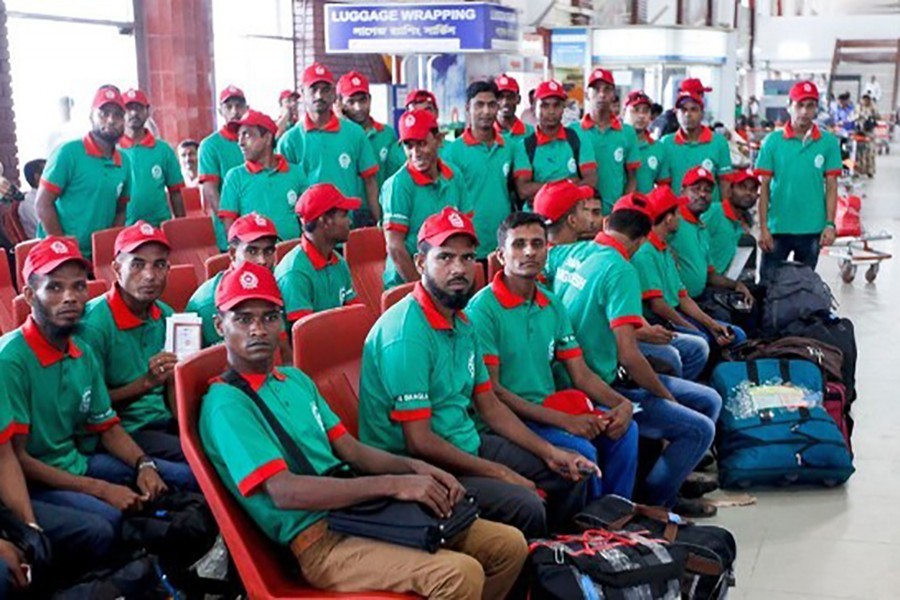Visa trading goes uncontrolled badly affecting the lives of Bangladeshi workers in Kuwait as many of them still remain jobless there, victims and insiders said.
In addition, they said, many workers already returned home empty-handed from the oil-rich country.
A section of politically influential persons in collusion with some dishonest officials of Bangladesh mission in Kuwait is allegedly involved in such visa trading, they claimed.
According to them, currently job opportunities are limited in Kuwait. Already a significant number of foreign workers have been recruited by the small gulf state.
But dishonest recruiters are active to hire more workers from Bangladesh as they get Tk 700,000 to Tk 800,000 if they can recruit a worker.
Wishing anonymity, a Bangladeshi migrant told the FE that manpower recruiters buy visas from fraudulent Kuwaiti employers. "In fact, the employers need no workers but they sell visas only for their personal gain."
Besides, the recruiters show higher demand than that of actual they get from employers. For example, if the recruiters receive demand for 100 workers, they submit it for 1,000 for getting approval.
In such way, many Bangladeshi workers have reached Kuwait so far. After two or three months, such visas expire and workers become illegal. Even if they are provided jobs, wages are very poor.
Citing another example, he said many cleaners get half of their basic salary.
Almost all the officials at the embassy are involved with manpower recruitment trade, he claimed.
Meanwhile, at least 600 jobless Bangladeshi workers have remained stranded in Kuwait for one and a half years. They were trapped by brokers in Bangladesh and some 'dishonest' employers in Kuwait. But all of them have smart cards and BMET clearances.
Talking to the FE, Robiul Alam, one of the victims, said he came to Kuwait one year back under a company named Al Kubra Logistics Experts for General Trading and Contracting Company. But the employer had no demand for workers. The company was involved only with selling of visas.
Due to visa trade, the employer was arrested by law enforcers recently.
Since then, Mr Alam said, they have been living in the gulf country as like as prisoners. "Now we are staying at a house without necessary foods, electricity and water supply."
A Bangladeshi gave them some dry foods two months back, but the stock has almost run out, he added.
It is very difficult for them to lead normal life here, but they cannot return home as they spent Tk 800,000 each to come to Kuwait, he mentioned.
When contacted, SM Abul Kalam, Bangladesh ambassador in Kuwait, refuted the allegations brought against them, saying that a section of people wants to tarnish the image of the mission and the government. "So, they are spreading propaganda against us."
His office is showing zero tolerance to such malpractices, he mentioned.
"No one can prove that the mission is involved with visa trading," Mr Kalam said, adding that if anyone can provide evidence, they will take stern action against the wrongdoers.
He said a section of manpower recruiters from both the countries are involved with such illegal activities. The mission doesn't know how they are hiring workers from Bangladesh as they attest only two types of visas-- driving and cook.
About stranded workers, he said they are trying to engage them in jobs as they have spent a large sum of money.
Experts said due to lack of fair practice in the migration process, visa trading continues unabated.
A section of officials concerned helps dishonest recruiters. That is why workers are deceived despite having smart cards and official clearance certificates, they added.
Ovibashi Karmi Unnayan Programme (OKUP) chairman Shakirul Islam said without proper verification of job demand and company profile, not a single worker should be sent to that country.
Relevant ministries, departments and missions should be accountable and transparent to get rid of illegal visa trading, he added.
According to embassy officials, about 300,000 Bangladeshis are now working in the oil-rich country. Most of them are engaged in the cleaning and construction sector.
In 2014, Kuwait resumed hiring workers from Bangladesh. Kuwait closed its market for Bangladeshi workers in 2007 after 'detecting irregularities in recruitment and their involvement in illegal activities'.


